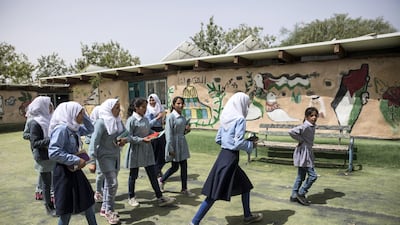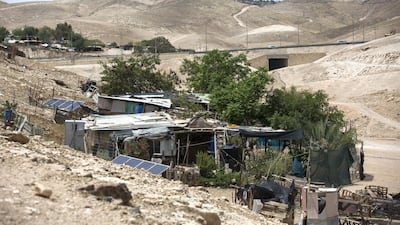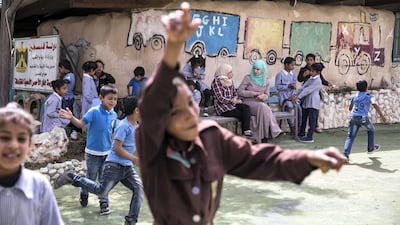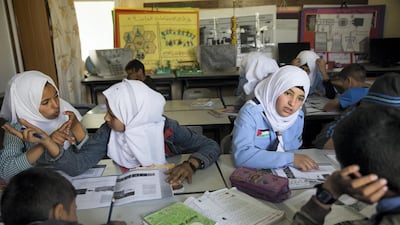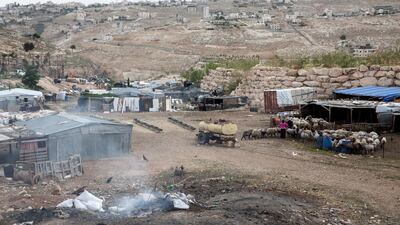In this tiny West Bank Bedouin village of Khan Al Ahmar, teachers were working hard Wednesday to keep pupils' minds focused on their studies – and not the impending demolition of their homes.
In the coming week, the Israeli Supreme Court is expected to rule on the fate of the village, situated east of Jerusalem along the main highway to the Dead Sea between the expanding settlements of Maale Adumim and Kfar Adumim. The latter's spacious homes are perched on a hilltop overlooking the corrugated metal and wood shanties here that are home to 35 families of the Jahalin tribe.
Khan Al Ahmar is one of 12 Bedouin settlements in the area, with a total population of about 1400 residents, that are threatened by demolition, in what critics say is a campaign to clear this strategic area of Bedouin encampments to bolster Israel's ambitions for permanent control and to facilitate expansion of nearby settlements.
The Israeli state says Khan Al Ahmar must be leveled because its structures were built without permits on state land. In fact, these permits are nearly impossible to obtain in the part of the West Bank known as area C that is under full Israeli control. According to government plans, the Bedouin are to be relocated to land near a refuse dump in Abu Dis, a West Bank suburb of East Jerusalem.
A foreshadowing of that was evident Wednesday when two army officers pulled up in a white vehicle, got out and walked near the school for a few minutes, M-16s slung on their shoulders.
_________
Read more
Gaza protests: Dozens of Palestinians injured by Israeli fire
Palestinian teen dies of gunshot to head from Israeli fire in Gaza
Giro d'Italia: Activists call for boycott of cycling race that begins in Israel
_________
In the school, a mud and tyres structure made by an Italian NGO, mathematics teacher Isra Zahran kept to the lesson plan despite the gnawing uncertainty. "We have exams next week, so we are preparing for exams," she said. Next door geography teacher Ghadeer Abu Taher offered up facts about Malaysia, including that it is a strong supporter of the Palestinian cause.
But asked about the future, pupils voiced disquiet. A sixth grade girl wearing a blue shirt with a Palestinian flag on it, spoke up. "We were born here, fifty years ago we were here, so it's very hard to leave this place."
The Bedouin came to Khan Al Ahmar in 1953 after being expelled from Israel's southern Negev desert, explained Eid Abu Khamis, a local leader. At the time, the area was under Jordanian rule. After Israel occupied the West Bank in 1967, the Bedouin continued their pastoral herding lifestyle and things were "more or less okay," Abu Khamis said. In later years, many landed jobs in nearby settlements.
After the 1993 Oslo Agreement, Khan Al Ahmar became part of area C and Israel started to impose strictures, for example by not allowing residents to build extensions of their homes, Abu Khamis said.
The construction of the school in 2009 was a turning point, with settler leaders viewing it as a consolidation of an unwanted Arab presence amid the settlements. Khan Al Ahmar residents lost their permits to work on the settlements, including Abu Khamis, who had worked for fifteen years in Kfar Adumim. Subsequently Israeli military administrators began issuing demolition orders for structures and in 2015 sent in bulldozers to destroy some homes, Abu Khamis said. Then, last March, the state issued demolition orders against the entire village. The villagers' Israeli lawyer, Shlomo Lecker filed a petition against the demolitions which a three judge panel is set to rule on.
Abu Khamis is bracing for the worst. While the European Union last year sharply criticized the demolition plans as a violation of international law, Abu Khamis on Wednesday said bitterly that "the world abandoned us. It didn't apply enough pressure."
The Israeli demolition plan is racist, he added.
"Look over there," he said, gesturing towards Kfar Adumim. "Look at all the things they get. Here we get demolition orders"
The state says it favors demolition because Khan Al Ahmar is an incontrovertible case of illegal building. Moreover, it added that the village's close proximity to a major highway poses a safety risk to its own residents. A spokeswoman for Israeli military administrators implied the Bedouin would be better off at the new site, saying that there they will be hooked up to electricity and water and could build legally. The spokeswoman added that authorities plan to build a new school at the new site.
But lawyer Lecker is unconvinced. "It is not a real alternative," he said. "The state is proposing a tiny area for each family, a quarter of a dunam [around 250 square metres] for a large family and herds. It is not an agricultural area, it is surrounded by buildings. Moreover, people in Abu Dis claim ownership of it and have warned the Bedouin not to come."
Danny Tirza, the mayor of Kfar Adumim, sees the Bedouin living near the highway at Khan al-Ahmar as a strategic threat to Israel. He was quoted last month in the Times of Israel saying: "It is one of the jobs of the settler movement to defend such strategic points in Judea and Samaria [the Israeli government term for the West Bank] from being taken over by the Palestinian Authority. These Bedouin were not just put there for no reason. The school was not built for no reason. It was built strictly out of political motives."
Hagit Ofran, who monitors settlements for the dovish Israeli Peace Now organization, notes that Khan Al Ahmar is close to Maale Adumim, whose leaders are seeking to expand their settlement in an area known as E1 so that it links up with Israeli settlement neighborhoods in East Jerusalem. That would deal a major blow to aspirations for a viable Palestinian state by cutting off Palestinian areas of the northern West Bank from those of the southern West Bank. "In general in area C the Israeli government does not want a Palestinian presence at all," Ofran said.
Abdullah Abdullah, a member of the Palestinian Legislative Council, termed the plan to evict Khan al-Ahmar residents "an absolute violation of international law. You can't relocate people according to your own designs. They've been in this area for decades."
"We insist they should stay where they are, it's their right," he said
